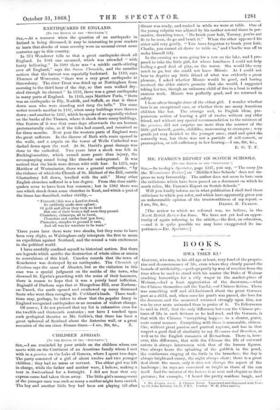EARTHQUAKES IN ENGLAND.
[TO THE EDITOR OF THE "SPECTATOR."1
Stit,—At a moment when the question of an earthquake in Ireland is being discussed, it may be interesting to your readers to learn that shocks of some severity were no unusual event some centuries ago in this country.
In 974 Wendover tells us that a great earthquake shook all England. let 1081 one occurred, which was attended " with heavy bellowing." In 1089 there was "a mickle earth-stirring over all England," says the Saxon Chronicle, and the annalist notices that the harvest was especially backward. In 1110, says Florence of Worcester, "there was a very great earthquake at Shrewsbury. The river Trent was dried up at Nottingham from morning to the third hour of the day, so that men walked dry- shod through its channel." In 1133, there was a great earthquake in many parts of England. In 1165, says Matthew Paris, "there was an earthquake in Ely, Norfolk, and Suffolk, so that it threw down men who were standing and rang the bells." The same writer records another in 1187, when many buildings were thrown down ; and another in 1247, which he speaks of as especially violent on the banks of the Thames, where it shook down many buildings. One feature of it was that some days afterwards the sea became preternaturally calm, as if the tides had ceased, and remained so for three months. Next year the western parts of England were the great sufferers. In the diocese of Bath wide rents opened ill the walls, and a cupola on the tower of Wells Cathedral was dashed down upon the roof. At St. David's great damage was done to the cathedral. Two years later a shock was felt in Buckinghamshire, which caused more panic than injury, the accompanying sound being like thunder underground. It was noticed that the birds were driven wild with fear. In 1275, says Matthew of Westminster, there was a general earthquake, "by the violence of which the Church of St. Michael of the Hill, outside Glastonbury fell down, levelled with the soil." Many other English churches suffered in a less degree. From this time earth- quakes seem to have been less common ; but in 1382 there was one which shook down some churches in Kent, and which a poet of the times has described, rather vividly,—
"Forsooth ! this was a Lord to dread,
So suddenly made men aghast ; Of gold and silver they took no heed But out of their houses full soon they passed.
Chambers, chimneys, all to burst, Churches and castles foul 'gan fare; Pinnacles, steeples to ground it cast, And all was for warriors to be ware."
Three years later there were two shocks, but they seem to have been very slight, as Waleingham only interprets the first to mean an expedition against Scotland, and the second a vain excitement in the political world.
I have carefully confined myself to historical notices. But there are legends which ascribe the destruction of whole cities or armies to convulsions of this kind. Camden records that the town of Kenchester was destroyed by an earthquake. The Chronicle of Evesham says the same of Alcester, but as the visitation in this case was a special judgment on the smiths of the town, who drowned St. Egwin's preaching with the noise of their hammers, there is reason to hope that it was a purely local infliction. Reginald of Durham says that at Mungedene Hill, near Norham- on-Tweed, the earth opened and swallowed up many thousand Scots who were then ravaging St. Cuthbert's lands. These tradi- tions may, perhaps, be taken to show that the popular fancy in England recognized earthquakes as au occasion of violent change. Of course, I do not pretend that my list is exhaustive even for the twelfth and thirteenth centuries ; nor have I touched upon such geological theories as Mr. Geikie's, that there has been a great upheaval of Scotland about the Antonine wall, or a great recession of the sea since Roman times.—I am, Sir, &c., Z.






























 Previous page
Previous page